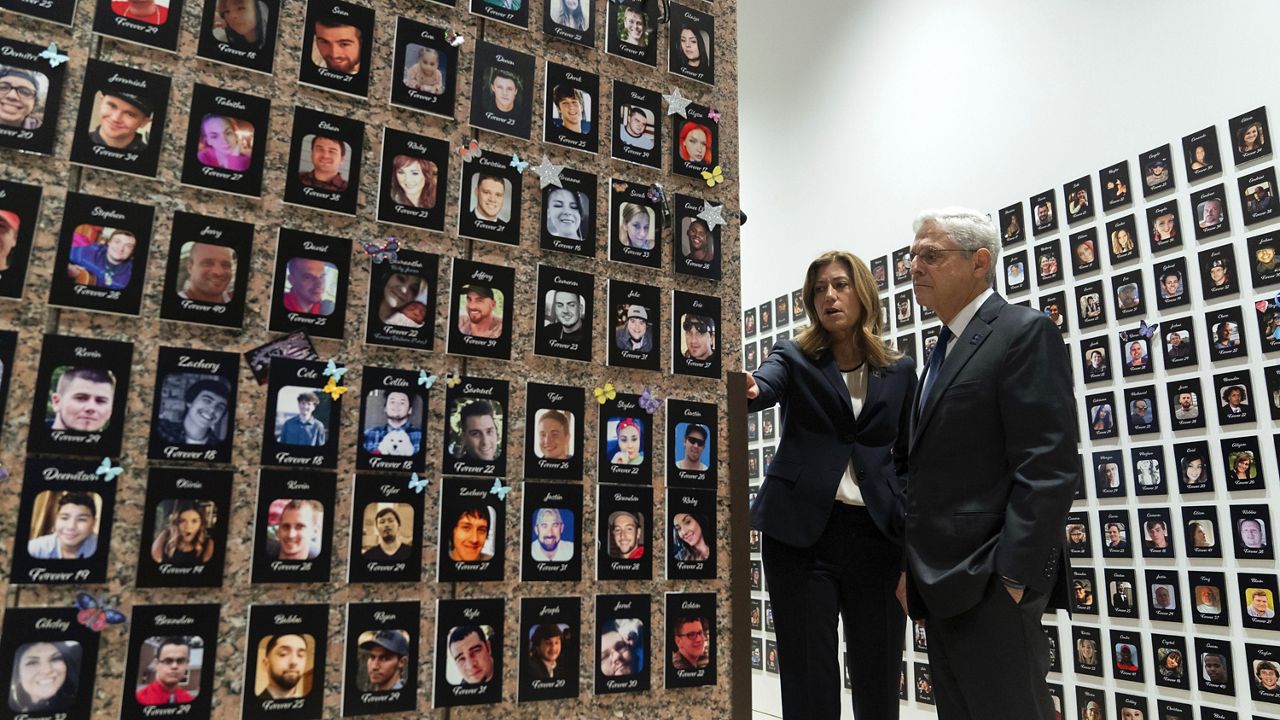Vowing to attack the nation’s fentanyl problem on multiple fronts, Attorney General Merrick Garland announced Tuesday the Justice Department has awarded $345 million in grants to support education, prevention, treatment and recovery programs.
What You Need To Know
- Vowing to attack the nation’s fentanyl problem on multiple fronts, Attorney General Merrick Garland announced Tuesday the Justice Department has awarded $345 million in grants to support education, prevention, treatment and recovery programs
- Garland spoke during a speech at the Drug Enforcement Administration’s National Family Summit on Fentanyl in Arlington, Virginia
- Meanwhile, the DOJ is “committed to bringing to justice those responsible for the epidemic in the first place,” the attorney general said
- Garland listed a series of recent arrests and convictions
“We know that no one — no one person and no one family — can defeat the epidemic alone. We need each other,” Garland said during a speech at the Drug Enforcement Administration’s National Family Summit on Fentanyl in Arlington, Virginia. “That is why the Justice Department is providing resources to public health and public safety programs across the country.”
Nearly a third of the funding will go toward the DOJ’s Comprehensive Opioid, Stimulant, and Substance Use Program for initiatives such as increased access to the overdose-reversing drug Naloxone, medication-assisted treatment and peer support to overdose survivors and their families.
Twenty-five million dollars will go toward support, mentoring and other services for young people who have been affected by opioid and other substance use, as well as those who are at risk for substance abuse.
“No one, especially no young person, should have to face this alone,” Garland said.
Garland did not say how all the grant money will be spent.
Meanwhile, the DOJ is “committed to bringing to justice those responsible for the epidemic in the first place,” the attorney general said. That includes, he said, targeting cartels in Mexico; their Chinese suppliers of chemicals used to make fentanyl; the cartels’ security forces, weapons suppliers and money launderers; and drug traffickers.
Garland listed a series of recent arrests and convictions. Among them was the extradition earlier this month of Ovidio Guzmán López, a son of former Sinaloa cartel leader Joaquin “El Chapo” Guzmán. Guzmán López is accused, along with his brothers, of leading the cartel after his father’s capture. He pleaded not guilty last week to drug trafficking, money laundering and other charges.
In April, the Justice Department charged 23 reputed members of the Sinaloa cartel, which Garland called “the largest, most violent and most prolific fentanyl trafficking operation in the world.” Federal agents are also zeroing in on the Jalisco New Generation cartel, the attorney general added.
Last week, 13 people allegedly involved in a conspiracy to sell drugs including fentanyl and methamphetamine in the St. Louis area, Garland noted.
And also in St. Louis, a judge sentenced a man to 15 years in prison for selling fake prescriptions pills laced with fentanyl that killed a man last year.
Garland got emotional when discussing the victim, who had a 2-year-old child. In a letter to the judge, the victim’s mother wrote her son knew the risks of fentanyl and that his “life was changing, he just needed more time.”
Addressing families of people who died from fentanyl overdoses, the attorney general said: “Our continued commitment to you is that, as we undertake this work, we will remember your loved ones. We do our work because of them and to honor them.”
“We will remember that they were extraordinary people with full lives,” he said. “We will remember that they had hopes and dreams for their future. We will remember they were mothers and fathers, daughters and sons. We will remember them, and we will remember all of the victims of the poisoning and overdose epidemic.”
According to the Centers for Disease Control and Prevention, more than two-thirds of all reported drug overdose deaths in the U.S. last year involved synthetic opioids other than methadone, mostly fentanyl.
This year, the DEA has seized more than 55 million fentanyl pills and over 9,000 pounds of fentanyl powder, Garland said.



